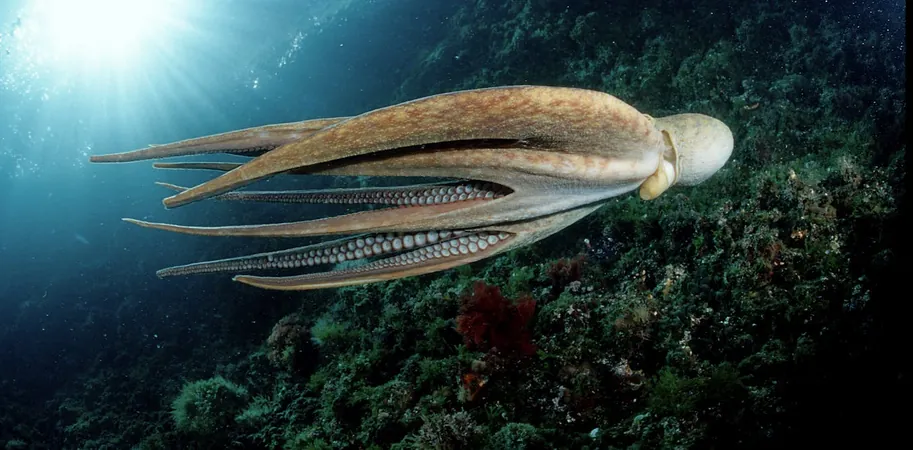
Unlocking the Secrets of Cephalopod Intelligence: A Dive into Animal Welfare
2024-12-20
Author: Charlotte
In the bustling world of animal cognition research, cephalopods—such as cuttlefish, octopuses, and squids—are rapidly becoming the stars of the show. One hard-to-forget subject of study, affectionately named Squirt, showcased the remarkable capabilities of these creatures. Known for his uncanny precision, anyone attempting to study him would inevitably experience a splash zone. It’s not just his dexterity that evokes curiosity; it’s also the question of whether these intelligent invertebrates possess emotional depth akin to mammals. While we cannot definitively attribute conscious thought to squid and octopus, their enigmatic behavior sparks ongoing debate among scientists and animal welfare advocates.
As researchers expand their understanding of cephalopod cognition, many are advocating for a reevaluation of how we treat these extraordinary animals. Legislative movements are reflecting this shift; in 2024, both California and Washington will ban octopus farming, with Hawaii considering similar regulations. Meanwhile, Congress is deliberating a halt on importing farmed octopus products. Even overseas, a proposed octopus farm in Spain’s Canary Islands is encountering stiff opposition from the scientific community, raising ethical concerns regarding aquatic animal farming.
Critics of octopus farming cite environmental impacts, such as potential waste release and disease transmission typically associated with aquaculture. Yet, the intriguing question remains: how do cephalopods compare intellectually to traditional livestock like chickens or cows? Is it plausible that these fascinating beings are more intelligent than your average turkey?
The Complexity of Cephalopod Intelligence
Cephalopods encompass a range of mollusks, including the most advanced and adaptable species—cuttlefish, squids, and octopuses. The diversity within this group is staggering, with sizes varying from the tiny Idiosepius, a mere few millimeters long, to the gigantic Architeuthis and Mesonychoteuthis, which can surpass 40 feet in length. Their habitats also vary dramatically; some prefer the dim depths of the ocean, while others thrive in vibrant coral reefs, where social interactions abound.
Research has predominantly focused on just a few species, making it essential to be cautious when generalizing cognitive capabilities across the cephalopod spectrum. How can we accurately assess such nuanced and potentially alien intelligence?
Rethinking Measurement of Intelligence
The assessment of intelligence—an already complex concept in humans—becomes even more challenging when considering non-human creatures with different sensory modalities and ways of processing the world. Many researchers have sought to develop objective measures of cognitive abilities that do not rely on human benchmarks. One method considers the ratio of brain size to body size. For example, the common octopus, Octopus vulgaris, boasts roughly 500 million neurons—comparable to that of a starling or turkey, given its size.
However, cephalopods have unique brain structures, with a significant portion of their neurons distributed throughout their arms in so-called "mini-brains." Most crucial cognitive functions seem to reside within a fraction of the brain, with an emphasis on visual processing. Despite the anatomical differences, increased brain complexity—indicated by structural wrinkling—correlates with higher intelligence in species that are more socially dynamic and require greater problem-solving skills.
Brilliant Behaviors and Learning Capacity
Beyond brain structure, behavioral evidence paints a clearer picture of cephalopod intelligence. Their renowned camouflage abilities showcase sophisticated visual processing and adaptive techniques for ambushing prey. The ubiquitous common cuttlefish can manipulate its skin to create patterns for communication as well as for hunting, a skill that highlights their advanced cognitive capacities.
Learning and memory outcomes—hallmarks of intelligence—underscore this further. Research demonstrates that various octopus species and cuttlefish can develop simple associations and even engage in reversal learning tasks, demonstrating their ability to adapt behaviors based on changing rewards. In one 2021 study, some cuttlefish exhibited delayed gratification, opting for a preferred prey even when an immediate but less desirable food option was available.
Towards a New Paradigm of Animal Welfare
What does all this mean for the ethical treatment of cephalopods? As their cognitive abilities appear comparable to those of vertebrates, advocates argue for the establishment of strict welfare regulations governing the treatment of these creatures in captivity. Just as certain societies have implemented welfare standards for common livestock, similar protections for cephalopods seem warranted.
In recent years, some advancements have emerged in ethical standards surrounding cephalopods. In 2010, the European Union mandated that ethical considerations be prioritized in research. By 2015, organizations like AAALAC International began promoting comprehensive guidelines for dealing with cephalopods ethically.
In conclusion, while cephalopods present distinctly "alien" forms of intelligence, they prompt important reflections on our understanding of consciousness and moral consideration across species. As discussions around animal welfare evolve, one thing is abundantly clear: we must give careful thought to the cognitive lives of all creatures we share this planet with, including our fascinating marine relatives. What implications might this have for our broader understanding of animal intelligence and our responsibilities toward it? The conversation has only just begun.









 Brasil (PT)
Brasil (PT)
 Canada (EN)
Canada (EN)
 Chile (ES)
Chile (ES)
 España (ES)
España (ES)
 France (FR)
France (FR)
 Hong Kong (EN)
Hong Kong (EN)
 Italia (IT)
Italia (IT)
 日本 (JA)
日本 (JA)
 Magyarország (HU)
Magyarország (HU)
 Norge (NO)
Norge (NO)
 Polska (PL)
Polska (PL)
 Schweiz (DE)
Schweiz (DE)
 Singapore (EN)
Singapore (EN)
 Sverige (SV)
Sverige (SV)
 Suomi (FI)
Suomi (FI)
 Türkiye (TR)
Türkiye (TR)